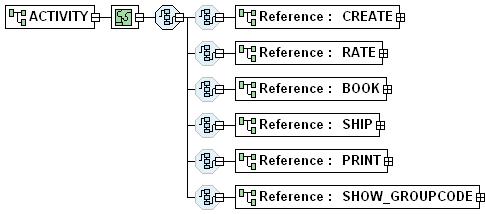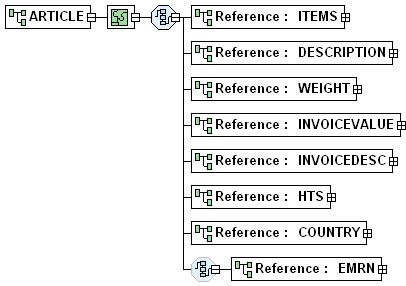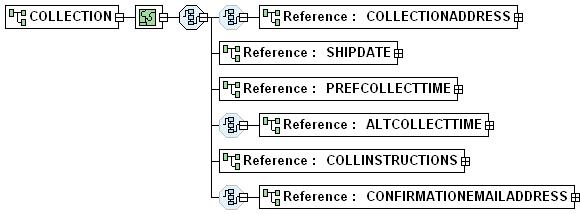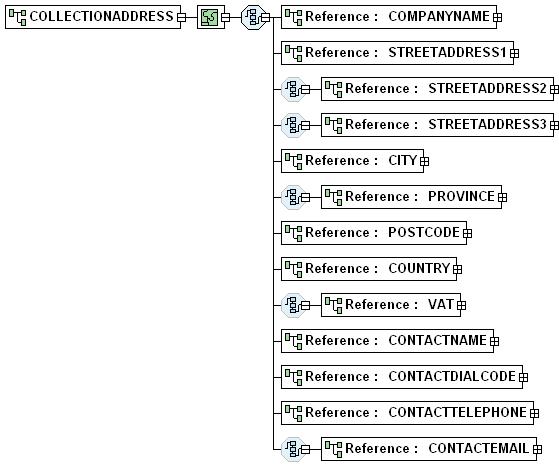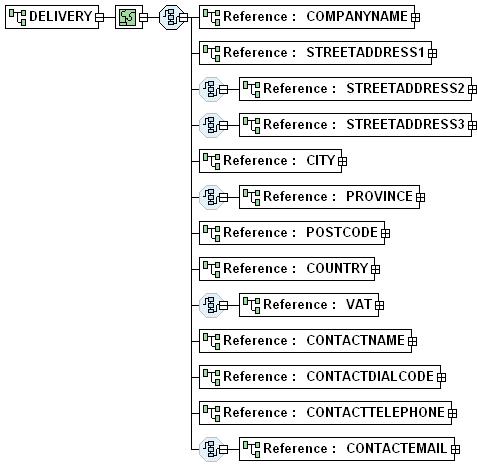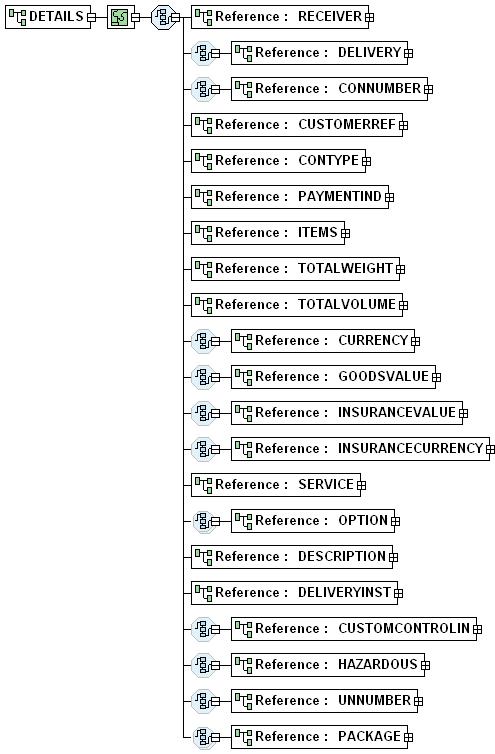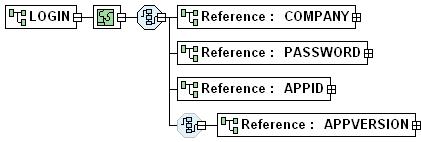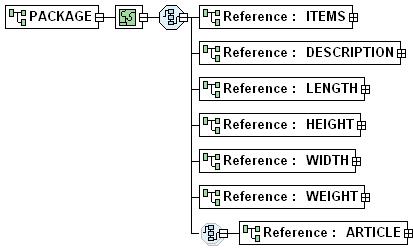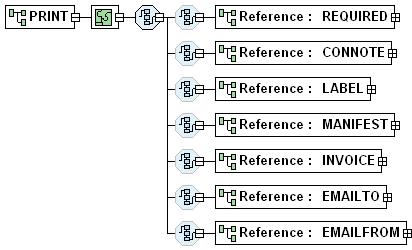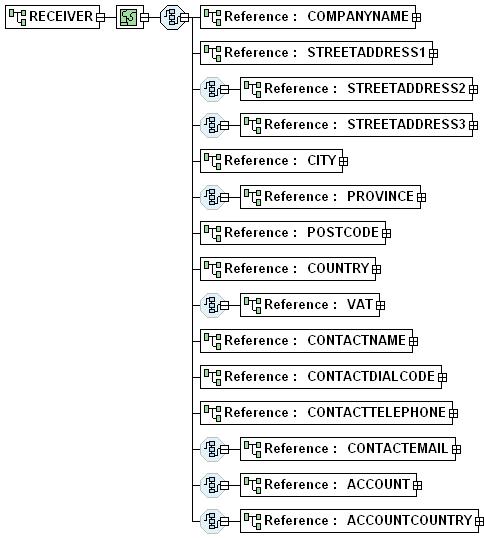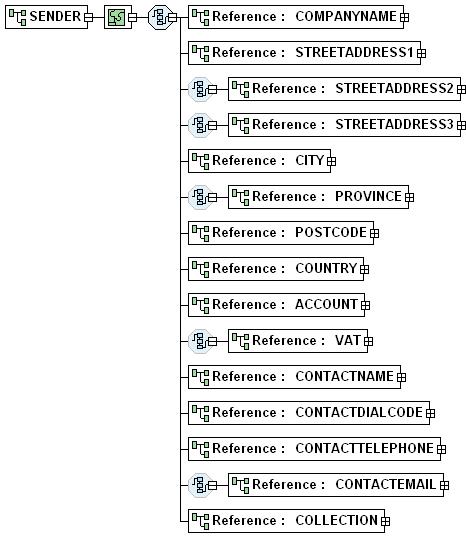Schema
Component Representation
<
xs:element name ="
BOOK ">
<
xs:complexType >
<
xs:choice >
<
xs:sequence >
<
xs:sequence minOccurs ="
0 "
maxOccurs ="
unbounded ">
<
xs:sequence minOccurs ="
0 "
maxOccurs ="
unbounded ">
</
xs:sequence >
</
xs:sequence >
</
xs:choice >
<
xs:attribute name ="
EMAILREQD "
type ="
xs :string"/>
<
xs:attribute name ="
ShowBookingRef "
type ="
xs :string"/>
</
xs:complexType >
</
xs:element >
Element: CITY
Schema
Component Representation
<
xs:element name ="
CITY "
type ="
xs :string"/>
XML Instance
Representation
<EMAILREQD>
xs :string
</EMAILREQD>
Schema
Component Representation
<
xs:element name ="
EMAILREQD "
type ="
xs :string"/>
XML Instance
Representation
<ShowBookingRef>
xs :string
</ShowBookingRef>
Schema
Component Representation
<
xs:element name ="
CITY "
type ="
xs :string"/>
XML Instance
Representation
<CONREF>
xs :string
</CONREF>
Schema
Component Representation
<
xs:element name ="
CONREF "
type ="
xs :string"/>
XML Instance
Representation
<CONNUMBER>
xs :string
</CONNUMBER>
Schema
Component Representation
<
xs:element name ="
CONNUMBER "
type ="
xs :string"/>
Name
COLLECTION
Type
Locally-defined complex type
Nillable no
Abstract no
Diagram
XML Instance
Representation
<COLLECTION>
Start Sequence
[0..1]
End Sequence
Start Sequence
[0..1]
End Sequence
Start Sequence
[0..1]
End Sequence </COLLECTION>
Schema
Component Representation
<
xs:element name ="
COLLECTION ">
<
xs:complexType >
<
xs:sequence >
<
xs:sequence minOccurs ="
0 ">
</
xs:sequence >
<
xs:sequence minOccurs ="
0 ">
</
xs:sequence >
<
xs:sequence minOccurs ="
0 ">
</
xs:sequence >
</
xs:sequence >
</
xs:complexType >
</
xs:element >
Name
COLLECTIONADDRESS
Type
Locally-defined complex type
Nillable no
Abstract no
Diagram
XML Instance
Representation
<COLLECTIONADDRESS>
Start Sequence
[0..1]
End Sequence
Start Sequence
[0..1]
End Sequence
Start Sequence
[0..1]
End Sequence
Start Sequence
[0..1]
End Sequence
Start Sequence
[0..1]
End Sequence </COLLECTIONADDRESS>
Schema
Component Representation
<
xs:element name ="
COLLECTIONADDRESS ">
<
xs:complexType >
<
xs:sequence >
<
xs:sequence minOccurs ="
0 ">
</
xs:sequence >
<
xs:sequence minOccurs ="
0 ">
</
xs:sequence >
<
xs:sequence minOccurs ="
0 ">
</
xs:sequence >
<
xs:sequence minOccurs ="
0 ">
</
xs:sequence >
<
xs:sequence minOccurs ="
0 ">
</
xs:sequence >
</
xs:sequence >
</
xs:complexType >
</
xs:element >
XML Instance
Representation
<COLLINSTRUCTIONS>
xs :string
</COLLINSTRUCTIONS>
Schema
Component Representation
<
xs:element name ="
COLLINSTRUCTIONS "
type ="
xs :string"/>
XML Instance
Representation
<COMPANY>
xs :string
</COMPANY>
Schema
Component Representation
<
xs:element name ="
COMPANY "
type ="
xs :string"/>
XML Instance
Representation
<COMPANYNAME>
xs :string
</COMPANYNAME>
Schema
Component Representation
<
xs:element name ="
COMPANYNAME "
type ="
xs :string"/>
XML Instance
Representation
<CONFIRMATIONEMAILADDRESS>
xs :string
</CONFIRMATIONEMAILADDRESS>
Schema
Component Representation
<
xs:element name ="
CONFIRMATIONEMAILADDRESS "
type ="
xs :string"/>
XML Instance
Representation
<CONNOTE>
Start Sequence
[0..*]
End Sequence
Start Sequence
[0..*]
End Sequence </CONNOTE>
Schema
Component Representation
<
xs:element name ="
CONNOTE ">
<
xs:complexType >
<
xs:sequence >
<
xs:sequence minOccurs ="
0 "
maxOccurs ="
unbounded ">
</
xs:sequence >
<
xs:sequence minOccurs ="
0 "
maxOccurs ="
unbounded ">
</
xs:sequence >
</
xs:sequence >
</
xs:complexType >
</
xs:element >
Name
GROUPCODE
Type
Locally-defined complex type
Nillable no
Abstract no
Diagram
XML Instance
Representation
<GROUPCODE>
Start Sequence
[0..*]
End Sequence
Start Sequence
[0..*]
End Sequence </CONNOTE>
Schema
Component Representation
<
xs:element name ="
GROUPCODE ">
<
xs:complexType >
<
xs:sequence >
<
xs:sequence minOccurs ="
0 "
maxOccurs ="
unbounded ">
</
xs:sequence >
<
xs:sequence minOccurs ="
0 "
maxOccurs ="
unbounded ">
</
xs:sequence >
</
xs:sequence >
</
xs:complexType >
</
xs:element >
Name
CONSIGNMENT
Type
Locally-defined complex type
Nillable no
Abstract no
Diagram
XML Instance
Representation
<CONSIGNMENT>
Start Choice
[1]
End Choice </CONSIGNMENT>
Schema
Component Representation
<
xs:element name ="
CONSIGNMENT ">
<
xs:complexType >
<
xs:sequence >
</
xs:sequence >
</
xs:complexType >
</
xs:element >
Name
CONSIGNMENTBATCH
Type
Locally-defined complex type
Nillable no
Abstract no
Documentation
SR 7855 CONSIGNMEN is now optional, as the input document
may be used purely to print a summary manifest or book a whole group
Diagram
XML Instance
Representation
<CONSIGNMENTBATCH>
Start Sequence
[0..1]
End Sequence
Start Sequence
[0..*]
End Sequence </CONSIGNMENTBATCH>
Schema
Component Representation
<
xs:element name ="
CONSIGNMENTBATCH ">
<
xs:complexType >
<
xs:sequence >
<
xs:sequence minOccurs ="
0 ">
</
xs:sequence >
<
xs:sequence minOccurs ="
0 "
maxOccurs ="
unbounded ">
</
xs:sequence >
</
xs:sequence >
</
xs:complexType >
</
xs:element >
XML Instance
Representation
<CONTACTDIALCODE>
xs :string
</CONTACTDIALCODE>
Schema
Component Representation
<
xs:element name ="
CONTACTDIALCODE "
type ="
xs :string"/>
XML Instance
Representation
<CONTACTEMAIL>
xs :string
</CONTACTEMAIL>
Schema
Component Representation
<
xs:element name ="
CONTACTEMAIL "
type ="
xs :string"/>
XML Instance
Representation
<CONTACTNAME>
xs :string
</CONTACTNAME>
Schema
Component Representation
<
xs:element name ="
CONTACTNAME "
type ="
xs :string"/>
XML Instance
Representation
<CONTACTTELEPHONE>
xs :string
</CONTACTTELEPHONE>
Schema
Component Representation
<
xs:element name ="
CONTACTTELEPHONE "
type ="
xs :string"/>
XML Instance
Representation
<CONTYPE>
xs :string
</CONTYPE>
Schema
Component Representation
<
xs:element name ="
CONTYPE "
type ="
xs :string"/>
XML Instance
Representation
<COUNTRY>
xs :string
</COUNTRY>
Schema
Component Representation
<
xs:element name ="
COUNTRY "
type ="
xs :string"/>
XML Instance
Representation
<CREATE>
Start Sequence
[1..*]
End Sequence </CREATE>
Schema
Component Representation
<
xs:element name ="
CREATE ">
<
xs:complexType >
<
xs:sequence maxOccurs ="
unbounded ">
</
xs:sequence >
</
xs:complexType >
</
xs:element >
XML Instance
Representation
<CUSTOMCONTROLIN>
xs :string
</CUSTOMCONTROLIN>
Schema
Component Representation
<
xs:element name ="
CUSTOMCONTROLIN "
type ="
xs :string"/>
XML Instance
Representation
<CUSTOMERREF>
xs :string
</CUSTOMERREF>
Schema
Component Representation
<
xs:element name ="
CUSTOMERREF "
type ="
xs :string"/>
Schema
Component Representation
<
xs:element name ="
DELIVERY ">
<
xs:complexType >
<
xs:sequence >
<
xs:sequence minOccurs ="
0 ">
</
xs:sequence >
<
xs:sequence minOccurs ="
0 ">
</
xs:sequence >
<
xs:sequence minOccurs ="
0 ">
</
xs:sequence >
<
xs:sequence minOccurs ="
0 ">
</
xs:sequence >
<
xs:sequence minOccurs ="
0 ">
</
xs:sequence >
</
xs:sequence >
</
xs:complexType >
</
xs:element >
XML Instance
Representation
<DELIVERYINST>
xs :string
</DELIVERYINST>
Schema
Component Representation
<
xs:element name ="
DELIVERYINST "
type ="
xs :string"/>
XML Instance
Representation
<DESCRIPTION>
xs :string
</DESCRIPTION>
Schema
Component Representation
<
xs:element name ="
DESCRIPTION "
type ="
xs :string"/>
Schema
Component Representation
<
xs:element name ="
DETAILS ">
<
xs:complexType >
<
xs:sequence >
<
xs:sequence minOccurs ="
0 ">
</
xs:sequence >
<
xs:element ref ="
ITEMS "/>
<
xs:sequence minOccurs ="
0 ">
</
xs:sequence >
<
xs:sequence minOccurs ="
0 ">
</
xs:sequence >
<
xs:sequence minOccurs ="
0 ">
</
xs:sequence >
<
xs:sequence minOccurs ="
0 ">
</
xs:sequence >
<
xs:sequence minOccurs ="
0 ">
</
xs:sequence >
<
xs:sequence minOccurs ="
0 "
maxOccurs ="
unbounded ">
</
xs:sequence >
<
xs:sequence minOccurs ="
0 ">
</
xs:sequence >
<
xs:sequence minOccurs ="
0 ">
</
xs:sequence >
<
xs:sequence minOccurs ="
0 ">
</
xs:sequence >
<
xs:sequence minOccurs ="
0 "
maxOccurs ="
unbounded ">
</
xs:sequence >
<
xs:sequence minOccurs ="
0 "
maxOccurs ="
unbounded ">
</
xs:sequence >
</
xs:sequence >
</
xs:complexType >
</
xs:element >
XML Instance
Representation
<EMAILFROM>
xs :string
</EMAILFROM>
Schema
Component Representation
<
xs:element name ="
EMAILFROM "
type ="
xs :string"/>
XML Instance
Representation
<EMAILTO
type="xs :string[0..1] "
>
xs :string </EMAILTO>
Schema
Component Representation
<
xs:element name ="
EMAILTO ">
<
xs:complexType >
<
xs:simpleContent >
<
xs:extension base ="
xs :string">
<
xs:attribute name ="
type "
type ="
xs :string"/>
</
xs:extension >
</
xs:simpleContent >
</
xs:complexType >
</
xs:element >
Element: EMRN
Schema
Component Representation
<
xs:element name ="
EMRN "
type ="
xs :string"/>
Name
ESHIPPER
Type
Locally-defined complex type
Nillable no
Abstract no
Documentation
Generated by XML Authority
Diagram
Schema
Component Representation
<
xs:element name ="
ESHIPPER ">
<
xs:complexType >
<
xs:sequence >
<
xs:element ref ="
LOGIN "/>
<
xs:sequence minOccurs ="
1 "
maxOccurs ="
1 ">
</
xs:sequence >
</
xs:sequence >
</
xs:complexType >
</
xs:element >
Element: FROM
Schema
Component Representation
<
xs:element name ="
FROM "
type ="
xs :string"/>
XML Instance
Representation
<HAZARDOUS>
xs :string
</HAZARDOUS>
Schema
Component Representation
<
xs:element name ="
HAZARDOUS "
type ="
xs :string"/>
Element: HTS
Schema
Component Representation
<
xs:element name ="
HTS "
type ="
xs :string"/>
XML Instance
Representation
<INSURANCECURRENCY>
xs :string
</INSURANCECURRENCY>
Schema
Component Representation
<
xs:element name ="
INSURANCECURRENCY "
type ="
xs :string"/>
XML Instance
Representation
<INVOICE>
Start Sequence
[0..*]
End Sequence
Start Sequence
[0..*]
End Sequence </INVOICE>
Schema
Component Representation
<
xs:element name ="
INVOICE ">
<
xs:complexType >
<
xs:sequence >
<
xs:sequence minOccurs ="
0 "
maxOccurs ="
unbounded ">
</
xs:sequence >
<
xs:sequence minOccurs ="
0 "
maxOccurs ="
unbounded ">
</
xs:sequence >
</
xs:sequence >
</
xs:complexType >
</
xs:element >
XML Instance
Representation
<INVOICEDESC>
xs :string
</INVOICEDESC>
Schema
Component Representation
<
xs:element name ="
INVOICEDESC "
type ="
xs :string"/>
XML Instance
Representation
<ITEMS>
xs :integer
</ITEMS>
Schema
Component Representation
<
xs:element name ="
ITEMS "
type ="
xs :integer"/>
XML Instance
Representation
<LABEL>
Start Sequence
[0..*]
End Sequence
Start Sequence
[0..*]
End Sequence </LABEL>
Schema
Component Representation
<
xs:element name ="
LABEL ">
<
xs:complexType >
<
xs:sequence >
<
xs:sequence minOccurs ="
0 "
maxOccurs ="
unbounded ">
</
xs:sequence >
<
xs:sequence minOccurs ="
0 "
maxOccurs ="
unbounded ">
</
xs:sequence >
</
xs:sequence >
</
xs:complexType >
</
xs:element >
XML Instance
Representation
<LOGIN>
Start Sequence
[0..1]
End Sequence </LOGIN>
Schema
Component Representation
<
xs:element name ="
LOGIN ">
<
xs:complexType >
<
xs:sequence >
<
xs:element ref ="
APPID "/>
<
xs:sequence minOccurs ="
0 ">
</
xs:sequence >
</
xs:sequence >
</
xs:complexType >
</
xs:element >
XML Instance
Representation
<MANIFEST>
Start Choice
[1]
Start Sequence
[0..*]
End Sequence
Start Sequence
[0..*]
End Sequence
End Choice </MANIFEST>
Schema
Component Representation
<
xs:element name ="
MANIFEST ">
<
xs:complexType >
<
xs:choice >
<
xs:sequence >
<
xs:sequence minOccurs ="
0 "
maxOccurs ="
unbounded ">
</
xs:sequence >
<
xs:sequence minOccurs ="
0 "
maxOccurs ="
unbounded ">
</
xs:sequence >
</
xs:sequence >
</
xs:choice >
</
xs:complexType >
</
xs:element >
XML Instance
Representation
<PACKAGE>
Start Sequence
[0..*]
End Sequence </PACKAGE>
Schema
Component Representation
<
xs:element name ="
PACKAGE ">
<
xs:complexType >
<
xs:sequence >
<
xs:element ref ="
ITEMS "/>
<
xs:element ref ="
WIDTH "/>
<
xs:sequence minOccurs ="
0 "
maxOccurs ="
unbounded ">
</
xs:sequence >
</
xs:sequence >
</
xs:complexType >
</
xs:element >
XML Instance
Representation
<PASSWORD>
xs :string
</PASSWORD>
Schema
Component Representation
<
xs:element name ="
PASSWORD "
type ="
xs :string"/>
XML Instance
Representation
<PAYMENTIND>
xs :string
</PAYMENTIND>
Schema
Component Representation
<
xs:element name ="
PAYMENTIND "
type ="
xs :string"/>
XML Instance
Representation
<POSTCODE>
xs :string
</POSTCODE>
Schema
Component Representation
<
xs:element name ="
POSTCODE "
type ="
xs :string"/>
Name
PREFCOLLECTTIME
Type
Locally-defined complex type
Nillable no
Abstract no
Diagram
XML Instance
Representation
<PREFCOLLECTTIME>
</PREFCOLLECTTIME>
Schema
Component Representation
<
xs:element name ="
PREFCOLLECTTIME ">
<
xs:complexType >
<
xs:sequence >
</
xs:sequence >
</
xs:complexType >
</
xs:element >
Schema
Component Representation
<
xs:element name ="
PRINT ">
<
xs:complexType >
<
xs:sequence >
<
xs:sequence minOccurs ="
0 ">
</
xs:sequence >
<
xs:sequence minOccurs ="
0 ">
</
xs:sequence >
<
xs:sequence minOccurs ="
0 ">
<
xs:element ref ="
LABEL "/>
</
xs:sequence >
<
xs:sequence minOccurs ="
0 ">
</
xs:sequence >
<
xs:sequence minOccurs ="
0 ">
</
xs:sequence >
<
xs:sequence minOccurs ="
0 ">
</
xs:sequence >
<
xs:sequence minOccurs ="
0 ">
</
xs:sequence >
</
xs:sequence >
</
xs:complexType >
</
xs:element >
XML Instance
Representation
<PROVINCE>
xs :string
</PROVINCE>
Schema
Component Representation
<
xs:element name ="
PROVINCE "
type ="
xs :string"/>
Element: RATE
XML Instance
Representation
<RATE>
Start Sequence
[0..*]
End Sequence
Start Sequence
[0..*]
End Sequence </RATE>
Schema
Component Representation
<
xs:element name ="
RATE ">
<
xs:complexType >
<
xs:sequence >
<
xs:sequence minOccurs ="
0 "
maxOccurs ="
unbounded ">
<
xs:sequence minOccurs ="
0 "
maxOccurs ="
unbounded ">
</
xs:sequence >
</
xs:sequence >
</
xs:complexType >
</
xs:element >
Schema
Component Representation
<
xs:element name ="
RECEIVER ">
<
xs:complexType >
<
xs:sequence >
<
xs:sequence minOccurs ="
0 ">
</
xs:sequence >
<
xs:sequence minOccurs ="
0 ">
</
xs:sequence >
<
xs:sequence minOccurs ="
0 ">
</
xs:sequence >
<
xs:sequence minOccurs ="
0 ">
</
xs:sequence >
<
xs:sequence minOccurs ="
0 ">
</
xs:sequence >
<
xs:sequence minOccurs ="
0 ">
</
xs:sequence >
<
xs:sequence minOccurs ="
0 ">
</
xs:sequence >
</
xs:sequence >
</
xs:complexType >
</
xs:element >
XML Instance
Representation
<REQUIRED>
Start Sequence
[0..*]
End Sequence
Start Sequence
[0..*]
End Sequence </REQUIRED>
Schema
Component Representation
<
xs:element name ="
REQUIRED ">
<
xs:complexType >
<
xs:sequence >
<
xs:sequence minOccurs ="
0 "
maxOccurs ="
unbounded ">
<
xs:sequence minOccurs ="
0 "
maxOccurs ="
unbounded ">
</
xs:sequence >
</
xs:sequence >
</
xs:complexType >
</
xs:element >
Schema
Component Representation
<
xs:element name ="
SENDER ">
<
xs:complexType >
<
xs:sequence >
<
xs:sequence minOccurs ="
0 ">
</
xs:sequence >
<
xs:sequence minOccurs ="
0 ">
</
xs:sequence >
<
xs:sequence minOccurs ="
0 ">
</
xs:sequence >
<
xs:sequence minOccurs ="
0 ">
</
xs:sequence >
<
xs:sequence minOccurs ="
0 ">
</
xs:sequence >
</
xs:sequence >
</
xs:complexType >
</
xs:element >
Element: SHIP
XML Instance
Representation
<SHIP>
Start Choice
[1]
Start Sequence
[0..*]
End Sequence
Start Sequence
[0..*]
End Sequence
End Choice </SHIP>
Schema
Component Representation
<
xs:element name ="
SHIP ">
<
xs:complexType >
<
xs:choice >
<
xs:sequence >
<
xs:sequence minOccurs ="
0 "
maxOccurs ="
unbounded ">
<
xs:sequence minOccurs ="
0 "
maxOccurs ="
unbounded ">
</
xs:sequence >
</
xs:sequence >
</
xs:choice >
</
xs:complexType >
</
xs:element >
XML Instance
Representation
<SHIPDATE>
xs :string
</SHIPDATE>
Schema
Component Representation
<
xs:element name ="
SHIPDATE "
type ="
xs :string"/>
Name
SHOW_GROUPCODE
Type
Locally-defined complex type
Nillable no
Abstract no
Diagram
Schema
Component Representation
<
xs:element name ="
SHOW_GROUPCODE ">
<xs:complexType />
</
xs:element >
XML Instance
Representation
<STREETADDRESS1>
xs :string
</STREETADDRESS1>
Schema
Component Representation
<
xs:element name ="
STREETADDRESS1 "
type ="
xs :string"/>
XML Instance
Representation
<STREETADDRESS2>
xs :string
</STREETADDRESS2>
Schema
Component Representation
<
xs:element name ="
STREETADDRESS2 "
type ="
xs :string"/>
XML Instance
Representation
<STREETADDRESS3>
xs :string
</STREETADDRESS3>
Schema
Component Representation
<
xs:element name ="
STREETADDRESS3 "
type ="
xs :string"/>
Element: TO
Schema
Component Representation
<
xs:element name ="
TO "
type ="
xs :string"/>
XML Instance
Representation
<UNNUMBER>
xs :string
</UNNUMBER>
Schema
Component Representation
<
xs:element name ="
UNNUMBER "
type ="
xs :string"/>
XML Instance
Representation
<PACKINGGROUP>
xs :string
</PACKINGGROUP>
Schema
Component Representation
<
xs:element name ="
PACKINGGROUP "
type ="
xs :string"/>
XML Instance
Representation
<DIVISION>
xs :string
</DIVISION>
Schema
Component Representation
<
xs:element name ="
DIVISION "
type ="
xs :string"/>
Element: VAT
Schema
Component Representation
<
xs:element name ="
VAT "
type ="
xs :string"/>
Complex Type:
Schema Component
Type
AusAddress
Schema Component
Name
Super-types:
Address
< AusAddress (by extension)
Sub-types:
QLDAddress
(by restriction)
If this schema component is a type definition,
its type hierarchy is shown in a gray-bordered box.
The table above displays the properties of
this schema component.
XML Instance Representation
<... country="Australia "
>
<unitNo>
string </unitNo> [0..1]
<houseNo>
string </houseNo> [1]
<street>
string </street> [1]
Start
Choice
[1]
<city>
string </city> [1]
<town>
string </town> [1]
End
Choice <state> AusStates
</state> [1] <postcode> string <<pattern =
[1-9][0-9]{3}>>
</postcode> [1] ?
</...>
The XML Instance Representation table above shows the schema
component's content as an XML instance.
The minimum and maximum occurrence of elements and
attributes are provided in square brackets, e.g. [0..1].
Model group information are shown in gray, e.g. Start
Choice ... End Choice.
For type derivations, the elements and attributes that have
been added to or changed from the base type's content are shown in
bold .
If an element/attribute has a fixed value, the fixed value
is shown in green, e.g. country="Australia".
Otherwise, the type of the element/attribute is displayed.
If the element/attribute's type is in the schema, a link
is provided to it.
For local simple type definitions, the constraints are
displayed in angle brackets, e.g. <<pattern =
[1-9][0-9]{3}>>.
If a local element/attribute has documentation, it will be
displayed in a window that pops up when the question mark inside
the attribute or next to the element is clicked, e.g.
<postcode>.
Schema Component Representation
<complexType
name ="AusAddress ">
<complexContent >
<extension base ="Address <sequence >
<element name ="state " type ="AusStates <element name ="postcode ">
<simpleType >
<restriction base ="string <pattern value ="[1-9][0-9]{3} "/>
</restriction >
</simpleType >
</element >
</sequence >
<attribute name ="country " type ="string fixed ="Australia "/>
</extension >
</complexContent >
</complexType >
The Schema Component Representation table
above displays the underlying XML representation of the schema
component. (Annotations are not shown.)
Abstract
(Applies to complex type definitions and element declarations). An
abstract element or complex type cannot used to validate an element
instance. If there is a reference to an abstract element, only
element declarations that can substitute the abstract element can be
used to validate the instance. For references to abstract type
definitions, only derived types can be used.
All Model
Group
Child elements can be provided in any order in instances.
See: http://www.w3.org/TR/xmlschema-1/#element-all .
Choice
Model Group
Only one from the list of child elements and model groups
can be provided in instances. See: http://www.w3.org/TR/xmlschema-1/#element-choice .
Collapse
Whitespace Policy
Replace tab, line feed, and carriage return characters with space
character (Unicode character 32). Then, collapse contiguous sequences
of space characters into single space character, and remove leading
and trailing space characters.
Disallowed
Substitutions
(Applies to element declarations). If substitution is
specified, then substitution group members cannot be used
in place of the given element declaration to validate element
instances. If derivation methods , e.g. extension,
restriction, are specified, then the given element declaration will
not validate element instances that have types derived from the
element declaration's type using the specified derivation methods.
Normally, element instances can override their declaration's type by
specifying an
xsi:type
attribute.
Key
Constraint
Like Uniqueness Constraint , but additionally
requires that the specified value(s) must be provided. See: http://www.w3.org/TR/xmlschema-1/#cIdentity-constraint_Definitions .
Key
Reference Constraint
Ensures that the specified value(s) must match value(s) from a Key
Constraint or Uniqueness Constraint . See: http://www.w3.org/TR/xmlschema-1/#cIdentity-constraint_Definitions .
Model
Group
Groups together element content, specifying the order in which the
element content can occur and the number of times the group of
element content may be repeated. See: http://www.w3.org/TR/xmlschema-1/#Model_Groups .
Nillable
(Applies to element declarations). If an element declaration is
nillable, instances can use the
xsi:nil
attribute. The
xsi:nil
attribute is the boolean attribute, nil , from the http://www.w3.org/2001/XMLSchema-instance
namespace. If an element instance has an
xsi:nil
attribute set to true, it can be left empty, even though its element
declaration may have required content.
Notation
A notation is used to identify the format of a piece of data. Values
of elements and attributes that are of type, NOTATION, must come from
the names of declared notations. See: http://www.w3.org/TR/xmlschema-1/#cNotation_Declarations .
Preserve
Whitespace Policy
Preserve whitespaces exactly as they appear in instances.
Prohibited
Derivations
(Applies to type definitions). Derivation methods that cannot be used
to create sub-types from a given type definition.
Prohibited
Substitutions
(Applies to complex type definitions). Prevents sub-types that have
been derived using the specified derivation methods from validating
element instances in place of the given type definition.
Replace
Whitespace Policy
Replace tab, line feed, and carriage return characters with space
character (Unicode character 32).
Sequence
Model Group
Child elements and model groups must be provided in the
specified order in instances. See: http://www.w3.org/TR/xmlschema-1/#element-sequence .
Substitution
Group
Elements that are members of a substitution group can be
used wherever the head element of the substitution group is
referenced.
Substitution
Group Exclusions
(Applies to element declarations). Prohibits element declarations
from nominating themselves as being able to substitute a given
element declaration, if they have types that are derived from the
original element's type using the specified derivation methods.
Target
Namespace
The target namespace identifies the namespace that components in this
schema belongs to. If no target namespace is provided, then the
schema components do not belong to any namespace.
Uniqueness
Constraint
Ensures uniqueness of an element/attribute value, or a combination of
values, within a specified scope. See: http://www.w3.org/TR/xmlschema-1/#cIdentity-constraint_Definitions .



